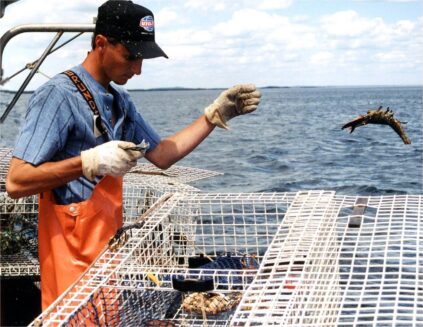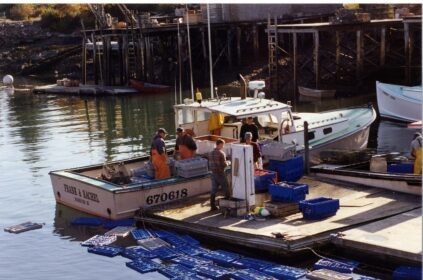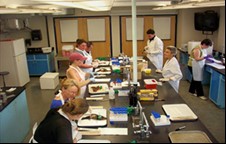
Lobsterman/Harvester
Job Descriptions
There are hundreds of thousands of people involved in the lobster industry, in a variety of jobs. In addition to those that fish for lobster, those connected to the industry include everyone from lobster dealers and processors, to bait dealers, boat builders, marine equipment suppliers, restaurateurs — and even innkeepers, artists and crafters who rely on a successful lobster fishery for their livelihood. Lobstering is more than a successful fishery…it is a cultural icon and a large part of the tourist trade in coastal communities in the North Atlantic Region .
Here are “job descriptions” for some of the basic jobs connected to lobstering and the lobster industry:
- Lobsterman or Harvester: A lobsterman (and most women prefer to be called lobstermen) is a man or woman who actually holds a commercial license and fishes for (or harvests) lobster. Inshore lobstermen set and haul traps or trawls (two or more traps attached to each other with rope). Lobstermen must be able to safely navigate a boat, moving from buoy to buoy to haul traps. They must be able to lift traps, which can weigh 40 pounds or more. They must also have accounting skills to keep track of expenses and income, and must be able to interpret the federal and state rules and regulations that are part of lobster management directives. Other duties include maintaining their lobster boat, keeping traps in good repair, obtaining bait and stuffing bait bags, and negotiating the sale of their lobsters.
- Sternman: Also known as an aftsman or deck-hand, a sternman does not actually hold a lobster license, but assists a lobsterman in the harvesting of lobster. He or she will bait, empty, stack, and drop traps. They do not haul traps or pilot the boat.
- Lobster Dealer : The lobster dealer typically runs the wharf in the harbor the lobstermen fish out of, and where they return to sell their catch. They buy lobsters from the harvesters, and sell them to a variety of outlets (i.e. restaurants, processors, and even other dealers). The lobster dealer also generally supplies bait to the lobstermen, and sometimes other marine supplies as well. Sometimes several lobstermen from one area will band together and form a cooperative (co-op) — acting as their own lobster dealer.
- Lobster Pound Owner: These people store live lobsters in coves or inlets that have been dammed in order to keep lobsters confined, yet allow for the flow of fresh tidal waters. Such coves or inlets are called tidal lobster pounds. Lobsters are stored in order to provide for the live market when catch rates are seasonally lower.
- Lobster Processor: Owners of lobster processing operations buy live lobsters from many dealers and other sources. Workers will then “process” or prepare the lobster for sale in the wholesale or retail marketplace. Processed lobster can take a variety of forms. Most is cooked and removed from the shell, and then sold as fresh or frozen meat. Sometimes the lobster is cooked and frozen whole in the shell. Other times the lobster is frozen uncooked, either whole or tails only. Lobster can also be canned or used as an ingredient in a number of value-added products.
- Lobster Scientist: Scientists from a number of different fields of study (for example biology, microbiology, animal & veterinary science, food science, etc.) may specialize in lobster research. Lobster Scientists can conduct research at universities, for the goverment in lobster management, or in private laboratories. Their work is focused on keeping the lobster resource healthy and the fishery successful.

Lobster Dealers Dock

Lobster Processing

Lobster Scientist
